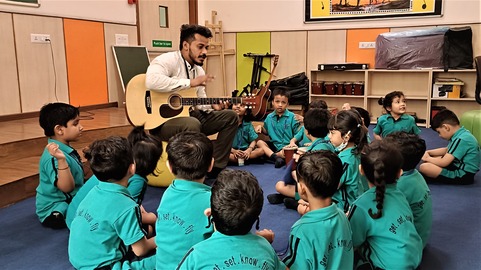Extracurricular activities are important for students because they aid in the discovery of their interests and identities. So that they can succeed in life and in their future careers, they help them develop their skills. They are also crucial for students because they give them access to new activities, friendships, and social skills development that they might not otherwise have. They can help students find their life’s purpose as well.
Students who participate in school after-hours activities learn life lessons that aren’t always covered at home or in the classroom, like how to accept failure even when you feel like you deserve it. Students have the opportunity to learn a variety of skills through extracurricular activities, including time management, stage presence in front of an audience, effective teamwork, and strong communication skills. They also learn how to collaborate without being abusive to one another.
What benefits do extracurricular activities offer at schools?
While extracurricular activities frequently necessitate a substantial amount of time outside of scheduled class times, they also provide students with the chance to acquire life skills that are crucial for their future success. These activities are a great way to keep your child engaged and give them the chance to learn something new at the same time.
A child’s development depends on activities outside of the classroom. They help a child develop their talents, build their self-esteem, and teach them social skills. Many parents are concerned about the time and money they spend on extracurricular activities. However, it has been demonstrated that extracurricular activities benefit kids’ academic performance as well as their mental health and general wellbeing.
Parents play a crucial role in their children’s extracurricular activities. They can help their children plan for extracurricular activities, organize their time, and create a schedule. The extracurricular activities, such as joining a sports team, learning an instrument, joining a theater group, or registering for an online course, require regular time commitment and initiative. It will be easier to keep your kids from engaging in the harmful behaviors that some students end up doing if you provide them with a variety of activities to do. Furthermore, extracurricular activities in schools are very important for a student’s development. During the exam period, students are under pressure to perform well and earn respectable grades. Extracurricular activities are necessary in these circumstances. There are countless opportunities to pick up new skills and find new passions outside of any academic curriculum. In order to balance their children’s education and fun, parents must find the right balance.
Which collegiate extracurriculars are worthwhile?
Each child has a unique personality, and it is important to develop those personalities in healthy ways. Children spend a large portion of their day at school. However, it’s crucial to support them in discovering additional talents and passions outside of the classroom. Children can participate in a variety of extracurricular activities while they are in school. Children can participate in and enjoy themselves while learning new skills and enhancing their resumes through these activities.
Sports, music, the arts, dance, drama, and many other extracurricular activities are included. Children can learn the value of teamwork through sports like soccer and football, and they can learn about different art forms in art classes. Student skill development can also be assisted by academic clubs like debate or chess teams. These are merely a few instances of extracurricular activities that advance kids’ education. When searching for a fun and instructive activity for your child to do in school, there are a ton more options to take into account.
How do extracurricular activities affect students?
Children’s development has been shown to benefit from extracurricular activities.
Extracurricular involvement in preschool increases the likelihood of academic and social success. These advantages set them up for future academic and professional success. Students who participate in extracurricular activities become knowledgeable, competent individuals with high moral standards who are responsible and able to make significant contributions to their own well-being as well as the welfare of society. Additionally, it improves the lives of students, their families, and communities while assisting with issues with peer pressure. Additionally, extracurricular activities have an impact on a person’s personal, social, and academic development. Schools should therefore strongly encourage students to take part in some activities.
Take advantage of any opportunities to participate in extracurricular activities because when you’re looking for a job, you need to have more than just your academic accomplishments on your CV.
A great way to make new friends, have fun while attending university, and make sure you maintain a healthy balance between studying and your social life is to get involved in sports clubs, societies, volunteering, and part-time employment.
However, it will also help you stand out as a candidate for graduate positions by providing you with a wealth of real-world examples that you can use to highlight your skills in job applications.
According to Chris Davison, deputy director and careers adviser with Durham University’s careers and enterprise team, extracurricular activities help students learn about themselves as well as develop and use their skills and knowledge in a variety of contexts. Such activities are a crucial part of the college experience, according to the statement.
sports organizations and clubs
Numerous clubs and societies that you can join are typically hosted by universities and students’ unions. There are three primary types:
sports groups
groups based on topics
social groups set up around common interests.
“All employers are looking for college students and recent grads with a variety of skills, character traits, and experience that will help them be successful in the workplace.” By participating in things you enjoy, extracurricular activities give you the chance to develop these skills. According to Ian Hodges, manager of careers and employability at the University of Exeter, this is the best chance to have a good time and improve your employability at the same time.
There will frequently be various groups for people of various abilities, such as distinct sports clubs for people who want to play competitively and for people who want to play more socially or for fitness.
You’re likely to find a club or society that suits your interests, whether you want to keep up a long-standing hobby or try something new. To find out what’s available, visit the freshmen’s fair, look at the faculty notice boards, and browse the website of the students’ union.
Don’t let the price deter you from joining a club or society; while some do charge a nominal fee, you will typically receive discounts on events and socials in exchange.
By participating, you’ll forge lifelong friendships and connections, get to know students from various backgrounds, and learn transferable skills like time management, organization, teamwork, and communication. It will also boost your self-assurance.
To advance your leadership development, you could take on additional responsibilities like club chair, treasurer, or secretary. The ability to demonstrate leadership experience will really appeal to graduate recruiters. study up on the skills that employers are looking for.
As an alternative, you could start your own club or society if there isn’t one already established that fits your interests. You can get advice on how to do this from your students’ union.
Volunteering
Another way to hone your skills and make connections with potential employers is to volunteer your time for free for deserving causes. It can broaden your understanding of a particular line of work, assist you in making career decisions, and give you “real life” experience in competitive fields like conservation.
You could offer your time to a non-profit or charitable organization, a school, a hospital, or a neighborhood community center. In the majority of roles, volunteering is feasible; however, keep in mind that some organizations demand experience, training, or knowledge, so do your research before applying.
Volunteering offers you the chance to enrich your resume with real work/life experience in addition to helping others and making new friends. Additionally, you’ll develop important abilities like decision-making, increase your self-assurance, and investigate various career options.
There is no cap on how much time you can devote to volunteering, whether it’s a few hours a week, a few days a month, or the entire summer break. Make sure any volunteer work doesn’t conflict with your university studies, part-time job, or other extracurricular activities by being realistic and careful.
Investigate the various volunteering options available to you and look for opportunities.
Working part-time
Working while in college enables you to make money while exploring various industries and learning about various roles. Additionally, it’s a fantastic way to meet people outside of your course or residence hall.
You can gain the necessary work experience from a part-time job, and you can use it as a reference in upcoming interviews. It’s an excellent way to show off a variety of abilities, such as responsibility, time management, and teamwork.
It is advised that you work no more than 20 hours per week to prevent your academic performance from suffering.
Never undersell your part-time job when applying for graduate jobs. Never say that you were “only working in a shop” during this experience. Instead, concentrate on the duties you performed, such as cashiering, opening and closing the store, or filling in for the team leader.
At the careers office of your university, you can look for part-time employment. Learn more about university jobs for students and how to combine work and study.
Regardless of the extracurricular activities you select to participate in, don’t forget to list the specific skills and knowledge you’ve acquired on job application forms. It could make all the difference.
If you’re a student looking to enhance your university experience and understand the importance of extra-curricular activities, Prospects offers valuable insights on their blog. They highlight how participating in extra-curricular activities can contribute to personal growth, skill development, and overall well-roundedness. Whether it’s joining a club, playing a sport, or engaging in community service, these activities can make a significant impact on your university journey. If you’re curious to explore more interesting topics, head over to SpinGenie.Ca. Their blog covers a wide range of subjects, including an article on the most expensive laptops available in the market.



